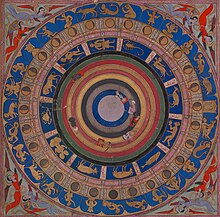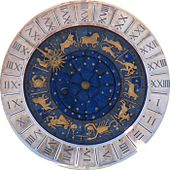
Back التنجيم في العصر الذهبي للإسلام Arabic মধ্যযুগীয় ইসলামী জ্যোতিষশাস্ত্র Bengali/Bangla Arabská astrologie Czech Astrologie arabe French Astrologi dalam Islam abad pertengahan ID Astrologia islamica Italian 중세 이슬람의 점성술 Korean Fanandroana arabo Malagasy Арапска и персиска астрологија Macedonian Arabische en islamitische astrologie Dutch

| Astrology |
|---|
 |
| Background |
| Traditions |
| Branches |
| Astrological signs |
| Symbols |
Some medieval Muslims took a keen interest in the study of astrology, partly because they considered the celestial bodies to be essential, partly because the dwellers of desert-regions often travelled at night, and relied upon knowledge of the constellations for guidance in their journeys.[1][2]
After the advent of Islam, the Muslims needed to determine the time of the prayers, the direction of the Kaaba, and the correct orientation of the mosque, all of which helped give a religious impetus to the study of astronomy and contributed towards the belief that the heavenly bodies were influential upon terrestrial affairs as well as the human condition.[1] The science dealing with such influences was termed astrology (Arabic: علم النجوم Ilm an-Nujūm), a discipline contained within the field of astronomy (more broadly known as علم الفلك Ilm al-Falak 'the science of formation [of the heavens]').[1] The principles of these studies were rooted in Arabian, Persian, Babylonian, Hellenistic and Indian traditions and both were developed by the Arabs following their establishment of a magnificent observatory and library of astronomical and astrological texts at Baghdad in the 8th century.
Throughout the medieval period the practical application of astrology was subject to deep philosophical debate by Muslim religious scholars and scientists. Astrological prognostications nevertheless required a fair amount of exact scientific expertise and the quest for such knowledge within this era helped to provide the incentive for the study and development of astronomy.
- ^ a b c Wasim Aktar, Contributions of Ancient Arabian and Egyptian Scientists on Astronomy; Public Science & Reference Archived 2012-05-17 at the Wayback Machine, retrieved 19 August 2011.
- ^ Ayduz, Salim; Kalin, Ibrahim; Dagli, Caner (2014). The Oxford Encyclopedia of Philosophy, Science, and Technology in Islam. Oxford University Press. p. 64. ISBN 9780199812578.